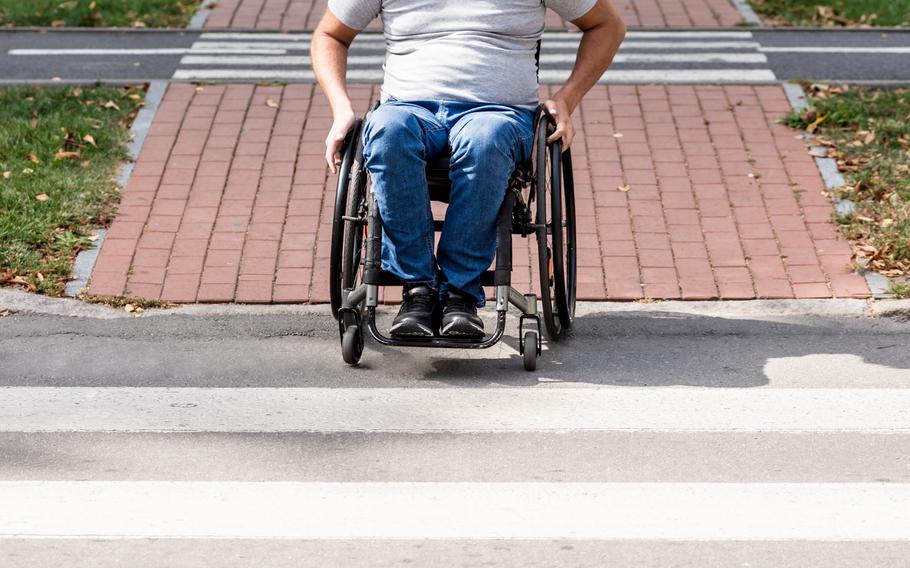Travel
Navigating Europe’s cities
Contributing Writer March 15, 2024

Man in wheelchair preparing to cross the road on pedestrian crossing ()
A study conducted in 2017 revealed that 25 percent of individuals with disabilities encounter difficulties during trips, in contrast to 10 percent of those without disabilities. With an estimated 1.3 billion people worldwide experiencing significant disabilities, including approximately 12.1 percent of the US population facing mobility issues, ensuring accessibility during travel becomes imperative, particularly in enchanting but potentially challenging European cities and towns.
Accessibility definitions vary across Europe, but for this article, “accessible” refers to spaces easy to navigate for wheelchair users. Given the uncertainty surrounding various factors, planning a vacation can become emotionally draining. Fortunately, numerous cities across Europe are actively striving to cater to diverse abilities, ensuring travelers can enjoy their journeys. To facilitate an enjoyable experience, consider the following steps.
Thorough Research: Investigate extensively before your trip to identify tourist areas and attractions that suit your needs, such as avoiding hilly streets in Paris or, opting for wheelchair-friendly sites like Pompeii’s ruins over Herculaneum.
Selecting Accommodation: Book accessible hotel rooms in advance, considering factors like cobblestone paths, proximity to transportation, and lack of elevators.
Seek Advice: Connect with fellow travelers with disabilities who have visited your destination to gather insights and overcome potential challenges.
Flexibility: This is nonnegotiable. Remain adaptable to unplanned circumstances and changes in plans.
Book Accessible Tours: Many companies offer tours tailored for accessibility. Inquire about options that align with your requirements.
Once you’ve prepared adequately and established contingency plans, enjoy the journey, wrap yourself in the culture of the country, and let the cuisine captivate your palate.
Air Travel Tips
If flying, adhere to the following steps for a seamless experience.
Inform the airline of any assistance requirements during ticket purchase or soon afterwards to prevent delays.
Utilize the rights granted by the Air Carrier Access Act, ensuring free wheelchair services on US-bound flights. Learn more about the Act here.
Notify the airline at least 48 hours in advance if transporting an electric wheelchair.
Arrange for airport transportation assistance if needed.
For those uncertain about destination choices, consider the following highly accessible European locations
Berlin, Germany: Ironically, the destruction of the city after WWII led to making Berlin an accessible city. Berlin offers wheelchair-friendly museums and hotels, aided by tools like the accessBerlin App for planning accessible routes.
Barcelona, Spain: Widely regarded as one of Europe’s most accessible cities, Barcelona offers accessible beaches, public transportation, and specialized tours aimed at wheelchair users.
Rome, Italy: Despite being considered “the City of the Seven Hills,” Rome features numerous accommodations and cultural attractions geared towards individuals with reduced mobility.
Tromso, Norway: This is the perfect city to chase the Northern Lights. Tromso offers accommodations and attractions accessible to those with limited mobility.
Salzburg, Austria: Known for its World Heritage-listed sites. This beautiful European destination that inspired “The Sound of Music” provides a variety of accessible attractions. The Salzburg Tourism page has available a “barrier-free vacation brochure“ to help you plan your trip.
London, UK: Rated the most accessible city in 2024, London offers a plethora of accessible restaurants, hotels, and attractions, making it an ideal destination for travelers with disabilities.
Feeling overwhelmed? Websites like booking.com and Sage Travel specialize in finding accessible accommodations and assisting with trip planning.
By following these guidelines and selecting from Europe’s accessible destinations, travelers with disabilities can enjoy incredible journeys, experiencing the world’s rich history, culture, and natural wonders without additional challenges.